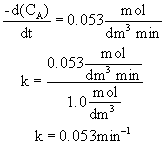
Problem
The reaction

is carried out in a constant volume batch reactor. Determine the reaction order and specific reaction rate from the following data.
| t (min) | 0 | 10 | 20 | 30 |
| CA(mol/dm3) | 1 | 0.6 | 0.4 | 0.3 |

| t | CA | 
|

|

|
| 0 | 1 | |||
| 0.4 | -(0.6-1.0)/(10-0)=0.04 | |||
| 10 | 0.6 | |||
| 0.2 | -(0.4-0.6)/(20-10)=0.02 | |||
| 20 | 0.4 | |||
| 0.1 | -(0.2-0.4)/(30-20)=0.01 | |||
| 30 | 0.3 |
First find
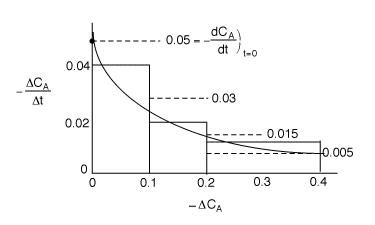
| t | CA | 
|

|
| 0 | 1 | 0.05 | |
| 0.04 | |||
| 10 | 0.6 | 0.03 | |
| 0.02 | |||
| 20 | 0.4 | 0.015 | |
| 0.01 | |||
| 30 | 0.3 | 0.005 |
Now plot versus t and it should be a straight line.
versus t and it should be a straight line.
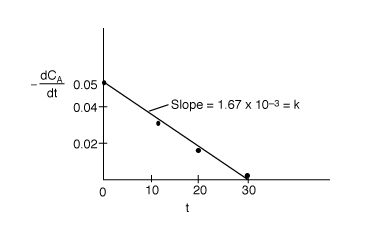
The plot is essentially linear, therefore the reaction is zero order. From the slope of the line we
find
k=0.00167 mol/dm3 min.
What two things are wrong with this solution?
1) The graphical differentiation of the data is incorrect
as is plotted as function of
is plotted as function of .
First, even the data of
.
First, even the data of versus
versus is
not plotted correctly. According to this incorrect analysis, it should rise
linearly. However, this fact is irrelevant because the x-axis should be time,
not
is
not plotted correctly. According to this incorrect analysis, it should rise
linearly. However, this fact is irrelevant because the x-axis should be time,
not . The correct plot is as follows.
. The correct plot is as follows.
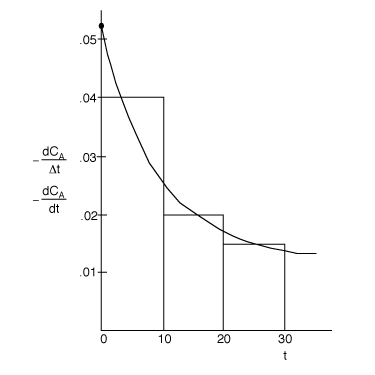
| t | CA | 
|
| 0 | 1 | 0.053 |
| 10 | 0.6 | 0.028 |
| 20 | 0.4 | 0.017 |
| 30 | 0.3 | 0.014 |
2) The plot to determine the reaction order and reate constant is incorrect. Combined mole balance and postulated rate law is

taking the natural log of both sides

Plot versus ln CA or plot
versus ln CA or plot versus CA on log-log paper to determine the reaction order. The correct plot on log-log is as follows.
versus CA on log-log paper to determine the reaction order. The correct plot on log-log is as follows.
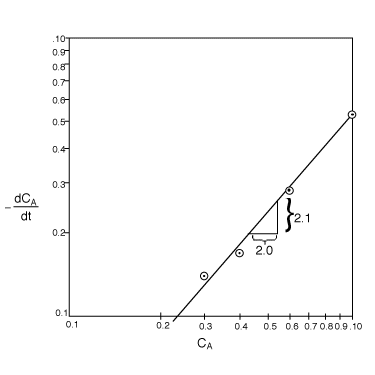
The reaction order is

therefore,

When CA=1.0 mol/dm3 then
